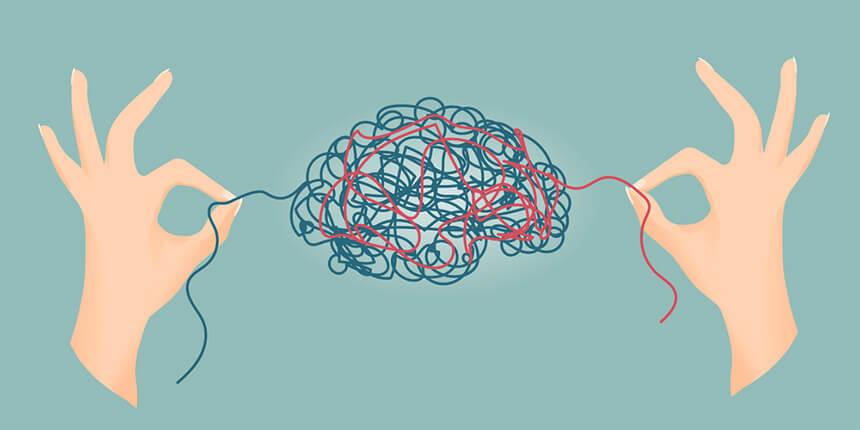Disease
What is "Youth Dementia"
Cervical cancer is one of the most common gynecological malignancies. Its incidence rate is second only to endometrial cancer worldwide, and it ranks first in developing countries and regions. According to statistics, there are 450000 new cases of cervical cancer worldwide every year. The occurrence and development of cervical cancer usually go through a relatively long process, so it is possible to prevent this disease.

Recently, friends around me often ask: "Doctor, why do I have a little 'dementia' in my mind when I was young? I feel that I can't concentrate, I am in a trance, I often can't find things, I lose everything, and sometimes I even have intermittent amnesia... What can I do?" Many netizens call this phenomenon "youth dementia". So, is "youth dementia" really dementia?
What is "youth dementia"?
According to relevant neurologists, we often encounter this kind of situation in our life, often missing things to do, suddenly unable to remember the name of the colleague who said hello yesterday, persistently looking for glasses while wearing glasses, just walking downstairs, but still unable to remember whether the door upstairs is closed... People often refer to "youth dementia", It is used to describe the intermittent inattention, memory decline and trance of young people in work or life.
We always think that young people should have ideals, goals, focus, work in an orderly manner, and rarely make careless mistakes. However, the truth always plays a little joke with you and forgets something inadvertently. It seems that many young people are becoming more and more "demented", often saying wrong things and remembering wrong things, and their memory is "getting worse", just like a little goldfish eager to break the "seven second rule".

How did "youth dementia" develop?
What on earth is it that makes modern young people frequently suffer from "youth dementia"? High intensity work pressure, irregular schedule, or huge social pressure? Who should carry the pot? In fact, the most common reasons for young people's performance, such as amnesia and inability to concentrate, are as follows.
- Chronic fatigue syndrome: with fast-paced work and learning, the incidence of brain fatigue is very high. After high-intensity or continuous work, learning, and use of electronic products, many people will feel dizzy, headache, inattention, memory decline, mental depression, reduced learning and work efficiency, poor coordination and other symptoms. If the brain cannot be effectively alleviated and improved, it is likely to turn into chronic fatigue syndrome, which is characterized by continuous attention decline, slow reaction, memory decline, mental depression, etc. in work and life. Especially in dangerous working environments such as driving, high temperature work, assembly line work, there is a risk of inducing personal accidents.
- Depressive disorder: refers to a kind of mood disorder caused by various reasons, which is mainly manifested as a significant and lasting depression, manifested as low mood, decreased interest in things, lack of happiness, and slow thinking. Once suffering from depression, even if there is no pathological abnormality in the brain, it will also lead to the dullness of attention, memory, thinking and judgment. Therefore, patients often have been reading newspapers, but can not read the content, can not understand the meaning, or forget the working time, can not quickly and correctly calculate the change when shopping. It should be noted that the mental retardation caused by depression is very similar to "early dementia", so it is called "pseudo dementia" academically.
- Neurasthenia: It refers to the phenomenon of mental excitability and mental fatigue, often accompanied by emotional annoyance, irritability, sleep disorder, muscle tension pain, etc., which can not be attributed to brain, body disease and other mental diseases due to long-term tension and pressure. Such patients are often accompanied by bad personality characteristics, such as inferiority, sensitivity, paranoia, impatience, etc., and there are obstacles in the psychological adjustment of life events, which makes the brain suffer from chronic tension. Symptoms are sometimes mild and sometimes severe, and the course of disease is often prolonged.
- Sleep disorder: sleep is an indispensable physiological phenomenon for human beings. In human life, sleep accounts for nearly 1/3 of the time, which has very important physiological significance. One of the most important functions of sleep is to consolidate new knowledge and skills in memory. It can help us improve the memory effect (20% - 40%) and save learning time. When a person enters deep sleep, the brain neurons will grow new synapses to strengthen the connections between neurons, so as to consolidate and strengthen memory. Sleep disorder is the main culprit of the common "youth dementia", which makes the brain in a state of weak excitement for a long time, unable to solidify memory. When this disease lasts for a long time, it will cause a series of psychological and cognitive disorders such as decreased daytime attention, laxity, and decreased coordination.
- Excessive drinking: Alcohol, also known as ethanol, is a small molecule substance that can penetrate the blood brain barrier and have a wide impact on the central nervous system. Recently, the world authoritative professional journal related to public health published a study on the relationship between alcohol consumption and cognitive impairment, which clarified that long-term excessive drinking is the main risk factor for inducing various cognitive impairment, especially early-onset dementia. Researchers investigated 57000 cases of early-onset dementia in France. The results showed that more than half of the diagnoses were related to alcohol or caused by alcohol abuse. In general, excessive alcohol intake will increase the risk of various types of dementia by three times. In addition, studies also suggest that long-term moderate to moderate alcohol consumption (>56 g/week) can significantly increase iron deposition in the basal ganglia of the brain, resulting in a decline in cognitive, memory, executive ability and response ability. Therefore, it is recommended to control the alcohol consumption below 56g/week, that is, no more than one glass of red wine or one can of beer every day.
"Youth dementia" does not stay
Generally, the "dementia" referred to in medicine is a clinical syndrome, which most often occurs in the elderly, especially those over 65 years old. The older the person is, the higher the incidence rate is. Dementia is not a normal aging process. It is a decline in brain function caused by progressive or rapid death of brain nerve cells. Its clinical manifestation is cognitive dysfunction, often accompanied by personality, mental, behavioral abnormalities, and even serious effects on daily living ability.
With the increase of age, people will experience age-related memory decline. Therefore, the decline of memory alone cannot be diagnosed as dementia. It should be noted that the often said "youth dementia" is not the early manifestation of "Alzheimer's disease", which is completely different from the two diseases. "Youth dementia" is more inclined to a disorder of physiological state, which can be significantly recovered after adjustment. However, the "early stage of Alzheimer's disease" is a serious pathological state. At present, there is no radical cure, and the disease will progress rapidly with time.

How to get out of the dilemma of "youth dementia"?
In the face of memory decline and loss caused by various reasons, we need to pay attention to and deal with them accordingly. So, how to get out of the dilemma of "youth dementia" scientifically? This requires adjustment of symptoms. Avoid overwork or long hours of high-intensity labor, work and study to achieve a combination of work and rest, relaxation and relaxation; Ensure adequate sleep at night, avoid staying up late, and work and rest regularly; Proper physical exercise can effectively improve brain blood supply and relieve tension; It can effectively relieve brain fatigue through massage, meditation, deep breathing, listening to music, etc. In addition, if you find that your forgetfulness is accompanied by obvious depression, decreased interest, anxiety, irritability, sleep disorder, etc., it is recommended to find a doctor related to psychology and spirit for diagnosis and treatment, relevant psychological counseling, and drug treatment when necessary. Through the above methods, amnesia, inattention, mental depression and other symptoms can be well improved.
Young and middle-aged people may also have "true dementia", that is, "early-onset dementia". Generally, it refers to dementia in adults aged 18 to 65 (defined as 45 by some scholars). Common causes include familial Alzheimer's disease, which is caused by specific gene mutations. Common genes include APP, PS1 and PS2 gene mutations. Down's syndrome, Huntington's syndrome and hepatolenticular degeneration in genetic diseases can also cause dementia; Neurodevelopmental related diseases, cerebral palsy syndrome caused by abnormal neural development before and after birth, and neuropsychiatric retardation; Brain trauma, cerebrovascular disease, encephalitis, etc. can cause dementia in young and middle-aged people.
The amnesia of "true dementia" is a progressive cognitive disorder caused by brain disease or injury, which is much higher than the normal aging process. Such amnesia often appears quickly and develops rapidly. With the aggravation of the disease, there will be slow thinking, poor speech, and often there will be nonsense, hallucinations and other mental behavior abnormalities. Some patients will be accompanied by seizures, loss of work and life ability Physical abnormalities and other pathological symptoms. If the above changes occur to the relatives or friends around, and they can not be identified as "true or false dementia", it is recommended to go to a regular hospital for professional evaluation.
-
![]()
![]() DiseaseDec 24, 2024
DiseaseDec 24, 2024How Can a Baby Have "Pimples" On His Face When He Is So Young?
-
![]()
![]() DiseaseDec 23, 2024
DiseaseDec 23, 2024Prevention of cardiovascular disease is more important than treatment
-
![]()
![]() DiseaseDec 22, 2024
DiseaseDec 22, 2024What Do I Need To Do To Check Myself For Nasopharyngeal Carcinoma? What Tests Are Needed To Confirm The Diagnosis Of Nasopharyngeal Carcinoma?
-
![]()
![]() DiseaseDec 21, 2024
DiseaseDec 21, 2024What Causes Oesophageal Cancer? What Symptoms Can Esophageal Cancer Cause In The Body?
-
![]()
![]() DiseaseDec 20, 2024
DiseaseDec 20, 2024Uremia Is Most Likely To Be "Dragged Out", The Body Appears 3 "Abnormal", Check As Soon As Possible




